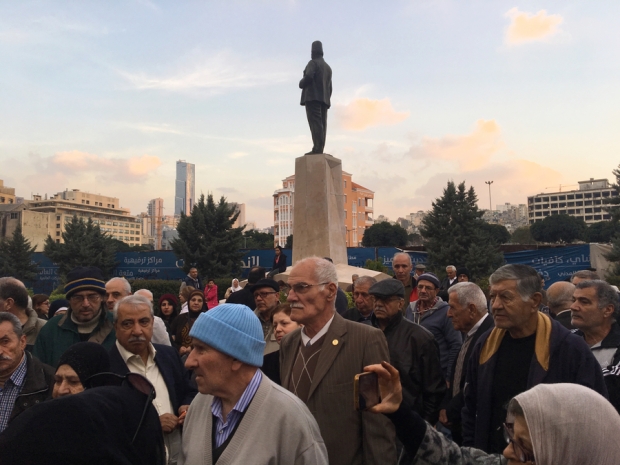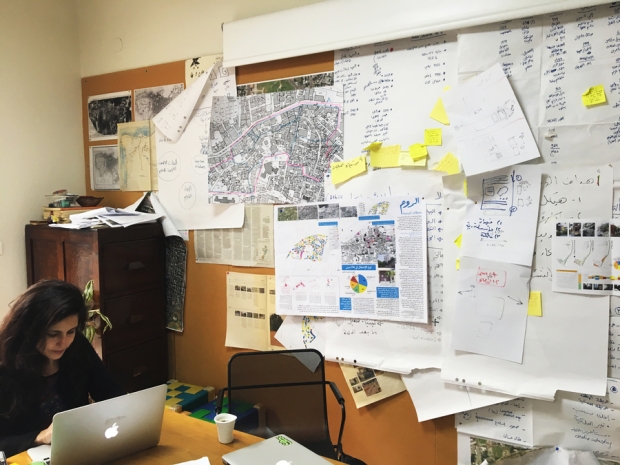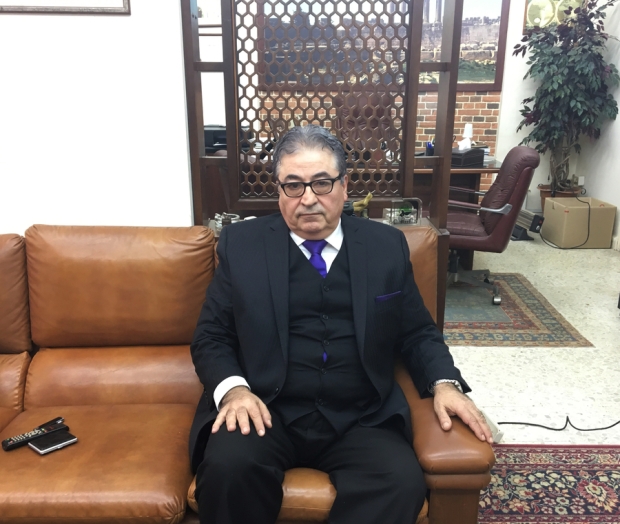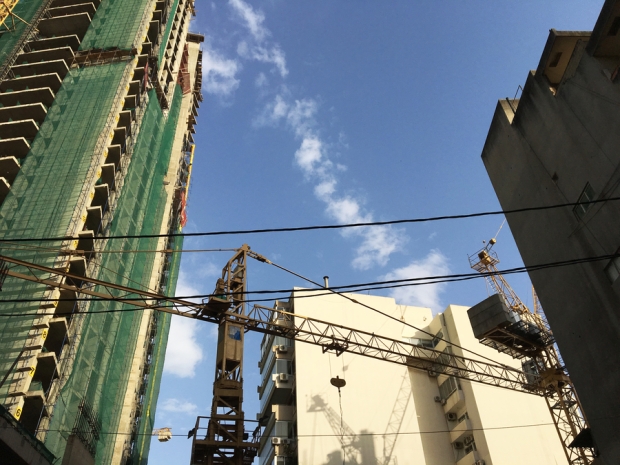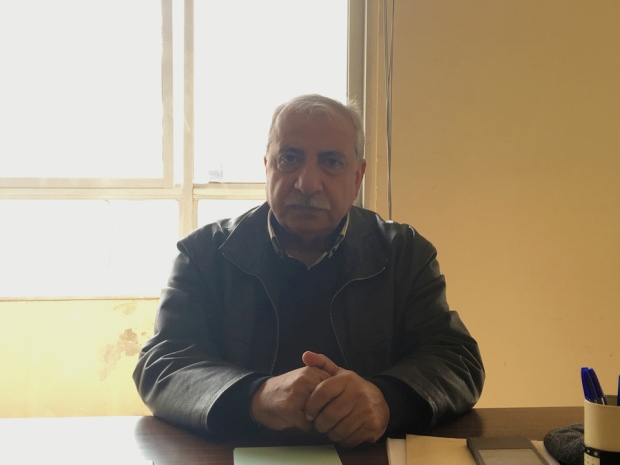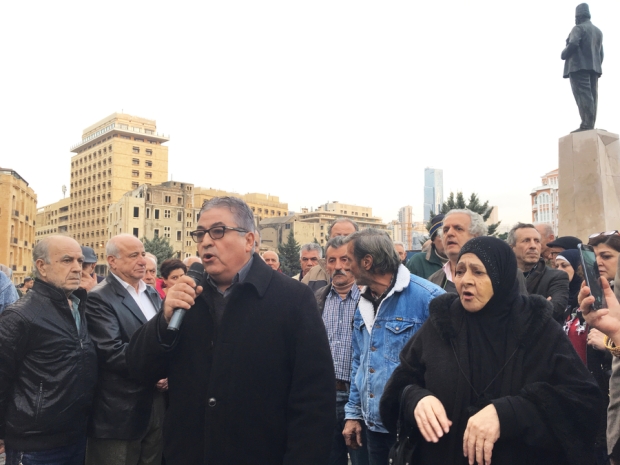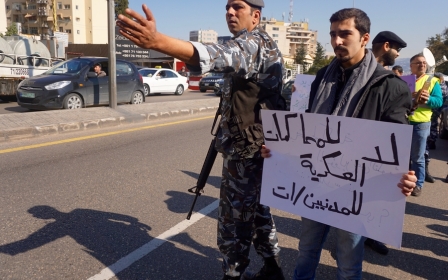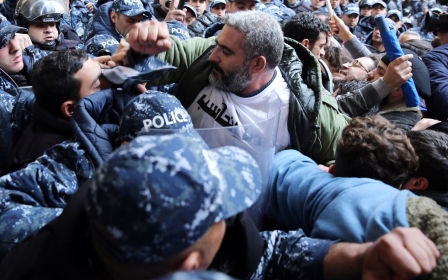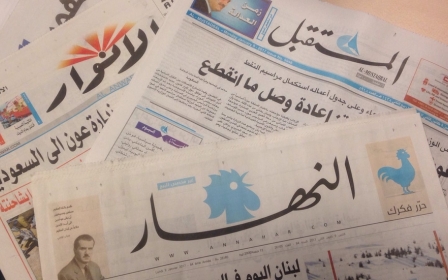Lebanon's senior citizens protest over threat of soaring rents
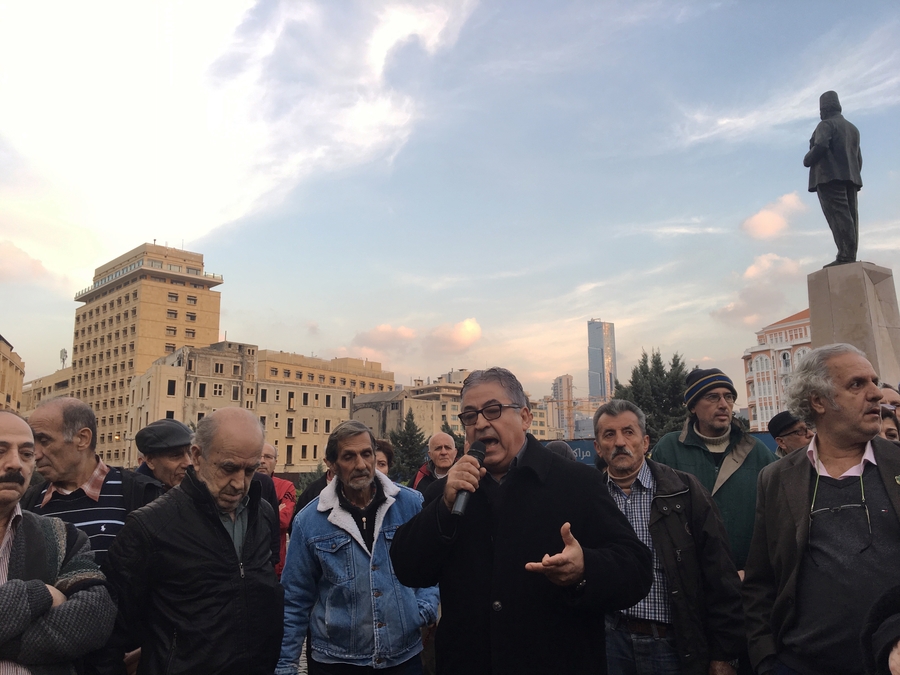
BEIRUT, Lebanon - On a cloudy Thursday afternoon, about 100 people gathered in downtown Beirut’s Riad Solh Square, facing the headquarters of Prime Minister Saad Hariri.
“If they don’t feel threatened, then they will never listen to us!” said a woman, chatting with a few others under the Riad Solh statue.
Riot police and military were present, slightly outnumbering the protesters, who vowed not to pay their bills and taxes, and pledged to disrupt society through civil disobedience.
“You called us protesters hooligans? Now we’re really going to be hooligans!” yelled one man through the microphone.
But this was no ordinary demonstration. The protesters were senior citizens.
“We’re taking matters into our own hands,” Zaki Taha, an active member of a popular committee to protect the rights of tenants, told Middle East Eye at the protest.
‘Old rent’
Following the end of Lebanon’s 15-year civil war in 1990, the government passed a rent law aimed at minimising the impact of hyperinflation.
The law froze rent in Beirut from 1992 onwards meaning that, when the Lebanese pound’s inflation is taken into consideration, some people pay as little as $200 per year.
New homes built since then were priced at market values.
In 2014, a new rent law was drafted so that rent became five percent of the current market value of the property.
“Tenants are asking for 1.5 percent of the property value to be their new rent [instead] – most can’t afford five percent,” explained Nadine Bekdache, a co-founder of Public Works Studio, and an active researcher at Beirut Madinati.
In January, the Lebanese parliament endorsed an amended version of the new rent law that decreased the amount to four percent. Once President Aoun signs the bill, it will become law.
Bekdache, who spoke to MEE at Public Works Studio’s office, said that the amended law was a symbolic reduction at most, describing the current situation as “legal chaos”.
‘Where are they going to go?’
Lebanon has adopted the Universal Declaration of Human Rights, which, in Article 25, recognises the right to housing.
Opponents of the new rent law argue that it does not take that into consideration.
One of the most outspoken protestors was Antoine Karam, a 61-year-old architect, and also a member of the popular committee.
Sitting at his office in the Badaro neighborhood of Beirut, he looked repulsed at the thought of President Aoun putting the new rent law into effect.
“But those old folks, those poor old folks. Where are they going to go?”
Karam already had an answer to what seemed to be a rhetorical question: “They have three options: the streets, the prison cell, or the grave.”
Erasing Beirut’s identity - and its residents
The elephant in the room in the rent controversy is Lebanon’s booming real estate industry.
“We aren’t against [property] owners; on the contrary, we see them as allies against the real estate giants and the [current] government,” Karam said.
“Once they [the government] is done with us, the real estate giants will knock them out next - mark my words!”
Downtown Beirut was once a buzzing district with trade and markets that brought people from all socioeconomic classes together from across the country.
The post-civil war reconstruction process was spearheaded by the late prime minister Rafic Hariri and his real estate company, Solidere, which took the reins of the process in 1994.
Former street markets are now luxury boutiques and brands, catering for a small fraction of the population, and wealthy tourists. People often refer to the area as “Solidere”.
“See what they did to downtown Beirut? That was Solidere 1. This new rent law is going to be part of a new scheme: Solidere 2,” said an infuriated Karam.
Recent developments across the city seem to confirm this.
UAE’s luxury real estate company, DAMAC Properties, has recently finished its key project in Beirut: a 28-storey luxury apartment tower, complete with interior furniture by Versace Home and the option of having a steam room or sauna in the bathroom.
“Look, even if President Aoun puts the law into effect, what matters is that we don’t stop until the housing crisis is solved,” Taha said with a passion often associated with student activists.
Seniors refuse to slow down
“It’s so sad to see elderly folks having to fight for some of their basic rights, when they should be enjoying their retirement,” Karam said with frustration.
As he ushered me out of his office, he asked if I’ll be joining them to block traffic at the crowded Barbir Bridge in Beirut – their next planned act of civil disobedience.
Abir Saksouk, another co-founder of Public Works Studio and researcher at Beirut Madinati, said that the existing narrative was “binary” and needed to change.
Taha, like the others who spoke to MEE, seem determined about pushing for justice, regardless of whether or not President Aoun puts the law into effect: “Popular movements are the only way we can make that law take middle-class and working families into consideration.”
New MEE newsletter: Jerusalem Dispatch
Sign up to get the latest insights and analysis on Israel-Palestine, alongside Turkey Unpacked and other MEE newsletters
Middle East Eye delivers independent and unrivalled coverage and analysis of the Middle East, North Africa and beyond. To learn more about republishing this content and the associated fees, please fill out this form. More about MEE can be found here.


